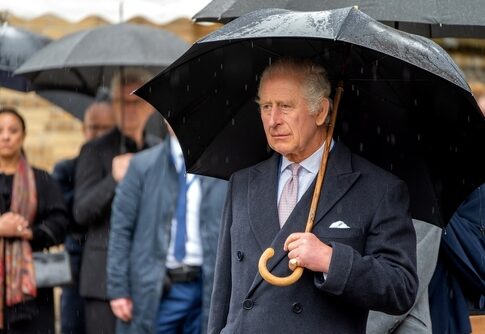A single, shouted question outside a centuries-old cathedral shattered the carefully maintained royal silence, and forced the British monarchy to face the very public reckoning it has spent years trying to avoid.
Public Confrontation Breaks Royal Protocol
King Charles III, never one to display public distress, remained stone-faced as a protestor’s piercing questions cut through the autumn air outside Lichfield Cathedral. “How long have you known about Andrew and Epstein?” the heckler demanded, as the monarch greeted well-wishers. Rather than engage, Charles pressed forward, leaving the questions hanging for all to hear. For a family so practiced in managing optics, this was a breach: the King confronted, the institution exposed, the public’s demand for answers unmistakable. The moment was captured on camera and broadcast worldwide, igniting a debate that reverberated far beyond the cathedral’s ancient stones.
This heckling was not an isolated flash of dissent. It marked a significant shift in the monarchy’s relationship with its subjects—a transition from whispered scandals and carefully worded press releases to raw, unscripted confrontation. The timing was no accident. The publication of Virginia Giuffre’s memoir after her tragic suicide reignited public anger over Prince Andrew’s settled abuse allegations and his longstanding, unexplained ties to Jeffrey Epstein. Andrew’s subsequent announcement that he would cease using his title of Duke of York did little to douse the flames. Instead, outrage spread to his continued residence at the opulent Royal Lodge—a privilege, it was revealed, he enjoys rent-free—while the monarchy fumbles for a solution that satisfies both tradition and public accountability.
Scandal, Settlement, and the Quest for Justice
The roots of the controversy reach back over a decade. Prince Andrew’s association with Epstein, a convicted sex offender, has been a festering wound for the royal family since Virginia Giuffre accused the prince of sexual abuse while she was a trafficked teenager. Although Andrew has always denied the allegations, his decision to settle Giuffre’s civil lawsuit in 2022 with an undisclosed payment did not exonerate him in the court of public opinion. Nor did it satisfy American authorities: in 2020, US investigators accused Andrew of offering “zero cooperation,” a charge that clashed starkly with his public vow to assist any inquiry.
The scandal’s emotional toll deepened when Giuffre died by suicide in April 2025. Her memoir, published soon after, poured accelerant on the controversy, making Andrew’s claims and conduct a renewed focus of global attention. The prince, now eighth in line to the throne, retreated from public duties and—under pressure—renounced his royal titles. Yet he clung to the Royal Lodge, a 30-room Crown Estate mansion he shares with his ex-wife, Sarah Ferguson. Reports that Andrew pays no rent on the property, despite its luxury and prime location, have become emblematic of the grievances fueling public outrage.
Political Pressure and Royal Dilemmas
As the scandal grew, so did calls for accountability. Senior UK government officials, including Business Secretary Peter Kyle and Shadow Justice Secretary Robert Jenrick, publicly demanded that Andrew cooperate fully with the US investigation into Epstein’s crimes. Their message was sharp: “Victims must be first,” Kyle declared, and Andrew’s commitment to the law and to his country would be measured not by words, but by deeds. The debate spilled into Parliament, with some lawmakers questioning whether the time had come for MPs to debate the role and privileges of the royals in the House of Commons.
Behind palace walls, pressure mounted on King Charles to resolve the impasse. Advisors urged him to personally confront Andrew and demand his departure from Royal Lodge, arguing that the prince’s continued presence was “doing real damage to the monarchy.” But the legal and emotional complexities are formidable. Andrew’s 75-year lease, signed in 2003, gives him formidable rights. Negotiations now center on where he will live next, what compensation he might receive for renovations, and how to limit further reputational harm to the Crown.
The Monarchy at a Crossroads
The heckling at Lichfield Cathedral signaled a turning point. Royal protocol, once a nearly impenetrable shield, could not protect the King from public anger or the relentless pursuit of accountability. Video footage of the confrontation spread rapidly, keeping the scandal—and the monarchy’s apparent inertia—in the public eye. The British public, footing the bill for royal residences and demanding justice for victims, has grown impatient with excuses and evasions.
The stakes are not merely reputational. If the monarchy is seen as sheltering a member tainted by association with serious criminal allegations, its legitimacy as a national institution could erode. The incident at Lichfield may embolden future protests and force a reckoning with the question: In modern Britain, can royal privilege coexist with the demands of transparency and justice? The world is watching not just what King Charles says, but what he does—and whether the institution he leads is capable of change.
Sources:
AOL News: King Charles Heckled Over Prince Andrew
Town & Country Magazine: King Charles Confronted Over Prince Andrew
The Independent: Prince Andrew, Royal Lodge, and Giuffre Updates
AOL News: King Charles Confronted by Angry Heckler

